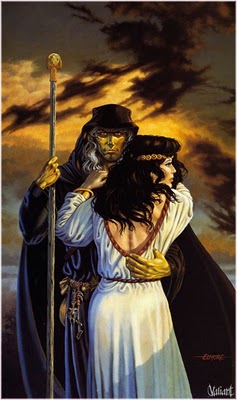
Some people are born bad, while others have badness thrust upon them. Some people turn to the dark side willingly, while others never have the chance not to. This is not to say that people are without free will, even bad people; however, though there is always a choice, and a person may be able to choose to ignore their circumstances and rise above them, sometimes circumstances conspire to a degree that making the right choice is nearly impossible. Such is the case in the tragic life of Raistlin Majere.
Raistlin was born a frail, sickly boy, introverted and offputting to those around him, but possessed of a keen intellect and nimble hands. His fraternal twin Caramon was exactly the opposite, being powerfully built, handsome, kind-hearted, and liked by all. Raistlin resented living in his brother’s shadow, which was made even worse by the fact that he was forced to rely on his brother for help with his poor health. Still, Raistlin found his niche in life when he began to learn magic. Here, his powerful mind was of use to him in a way that no one could take from him, and he had a gift his brother’s average intellect could never dream of. However, in the world of Krynn, wizards who reach a certain level of power must take the Test of High Sorcery to advance further, and Raistlin gladly agreed to the tests. Much transpired in those tests, and while he did pass, Raistlin was never the same. His health became even worse, his skin became gold and his hair white, and he was cursed by the head of the wizards of the tower with hourglass-shaped eyes that forced him to see the world as decaying around him. Raistlin’s natural dislike of others was only heightened by these events, and while he had not yet turned evil, he was certainly walking the path towards it.
I have always wondered why Raistlin’s test was so particularly difficult, and why Par-Salian, a good-aligned wizard, cursed him so severely when plenty of evil wizards far worse than Raistlin must have passed through those gates as well. I suspect that the elder wizard must have seen potential for greatness in the boy, and strove to test him much harder than most, as well as teach him humility, to serve as a crucible in which Raistlin’s inner goodness would be drawn out. Unfortunately, it is often the case that when we think we’re helping people to grow stronger through tough love, we are in fact breaking them, and I believe this is what happened to Raistlin. Instead of learning the “right” lessons from his harsh testing, he saw that even the supposed forces of good were against him, and ultimately decided that he could trust or rely on no fairness other than what he created for himself. It didn’t help that Raistlin was also being manipulated by another powerful mage, the evil and immortal Fistandantilus. While he did ultimately defeat and even steal Fistandantilus’s power, this further taught Raistlin that he was alone in the world.
Eventually, Raistlin turned away from his comrades during the War of the Lance and gave himself over to evil. Part of what makes him compelling, however, is that he did so on his own terms. While most of the villains of Krynn blindly and devoutly serve the dark goddess Takhisis, Raistlin refused her patronage and set out to acquire power beyond that of the gods. Given his distrust of everyone in the world, it seems logical that he would hate the gods, around whose power and plots the world itself turns. He managed to unlock power that no human before had ever harnessed, and set about his ultimate goal of slaying all the gods and replacing them as the sole divinity. In truth, he would have succeeded, except that his brother reached out to show him a future he had seen: that all he would have ruled was an empty and desolate universe in which he could create nothing and would suffer unending emptiness for all of eternity. Raistlin, in what one could argue was either an act of ultimate altruism or ultimate selfishness, allowed himself to die rather than inflict this fate on himself and/or the universe.
While Raistlin was indeed a cold and selfish man, unwilling to submit to any authority or trust anything beyond himself, he had a soft spot for the downtrodden and oppressed. He hated to see anyone suffer as the result of matters beyond their control, particularly problems they were born with, and he often protected beings even his good comrades overlooked. It is easy to say that he felt this way as a result of his own treatment, and this was perhaps an extension of his eternal selfishness, but being able to extend these feelings to others shows that he was not a complete monster.
Raistlin made his choices, many of them petty and heartless, but it’s impossible to look at him without considering what most of us would have done in his place. He was sculpted by tragedy, misfortune, and poor decisions into becoming a villain, and even then, his villainy was never as twisted or cruel as most of those who swore allegiance to evil in his world. Indeed, there is actually much to admire about Raistlin, from his compassion for the weakest, to his unflinching ability to take on the entire world by himself and win, to the fact that most of his crimes were done to beings more evil than himself. Of course, despite this, it is important not to forget that his designs would have ultimately been far worse for the world than even the monsters he destroyed.
